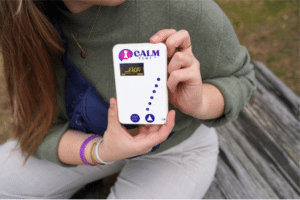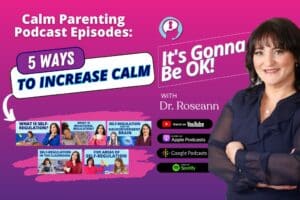Does magnesium improve mood? Magnesium, the fourth most abundant mineral in the body, is often overlooked. Yet, it plays a crucial role in numerous bodily functions, including those impacting our mood and mental well-being.
Research shows that magnesium deficiency may be linked to various mental health concerns, while supplementation has shown promising results in improving symptoms (Botturi et al., 2020). It’s time to discover what magnesium can do for the body and its potential benefits for mood and mental health.
Can Magnesium Help with Depression?
Research suggests that magnesium supplementation might be beneficial for people struggling with depression (Serefko et al., 2013). In a recent interview on my podcast, It’s Gonna be OK!, Dr. Jaquel Patterson cites a 2020 meta-analysis published in the Journal of Affective Disorders, which combined data from several studies.
The study concluded that magnesium supplementation significantly reduced depressive symptoms compared to placebo. However, she emphasizes the importance of individual needs and consulting a healthcare professional before taking any type of magnesium supplement for depression.
Magnesium can combat depression by influencing neurotransmitter regulation, such as serotonin, which is integral to mood stability. Its anti-inflammatory properties may alleviate depressive symptoms linked to chronic inflammation, and by balancing stress hormones and supporting energy production, magnesium contributes to an overall improvement in mental well-being.
Additionally, magnesium's role in regulating the nervous system can help maintain mood stability, making it a potential supportive element in depression management when included as part of a comprehensive treatment plan.
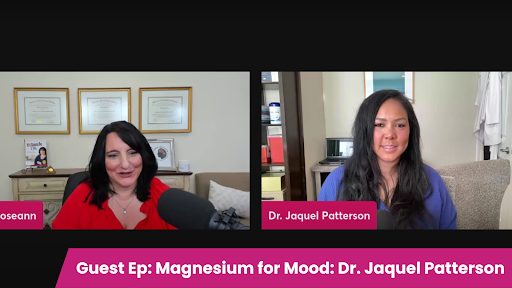
What’s the Best Magnesium for Depression and Anxiety?
My podcast with Dr. Jaquel Patterson, well known naturopath, specializing in herbal and nutritional interventions, highlights the delicate link between the lack of magnesium and depression. Studies have shown that individuals with depression often exhibit lower magnesium levels, suggesting a potential deficiency contributing to their symptoms.
Does magnesium help with depression? She explains, “Magnesium acts as a cofactor in over 300 enzymatic reactions in the body “including those involved in neurotransmitter production and regulation, which significantly impact mood.”
Magnesium and Mood: Finding the Right Match
When it comes to incorporating magnesium into your mental health regimen, choosing the right form is crucial. The diverse array of magnesium compounds available each offers distinct benefits in terms of absorption and suitability.
Dr. Patterson highlights several key magnesium options and sheds light on their specific advantages:
1. Magnesium Glycinate
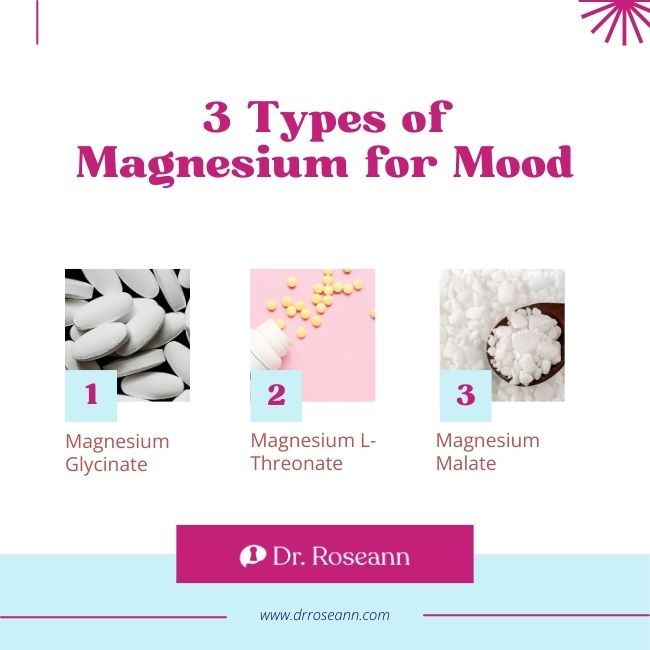
Magnesium glycinate stands out as a highly bioavailable form, renowned for its gentle effects on the digestive system. This variant is particularly well-tolerated and is often recommended for individuals seeking relief from mood-related challenges such as anxiety.
The calming properties associated with magnesium glycinate make it the best magnesium for mood disorders. It’s the preferred choice for those looking to address mental health concerns without the risk of digestive discomfort.
2. Magnesium L-Threonate
Offering a unique advantage, magnesium L-threonate possesses the ability to cross the blood-brain barrier effectively. This attribute positions it as a potential ally for cognitive function enhancement and mood regulation. It also makes magnesium L-threonate as the best magnesium for mental health.
Dr. Patterson suggests considering magnesium L-threonate for individuals aiming to optimize mental clarity and mood by facilitating a more direct impact on brain health. For these reasons, magnesium L-threonate is regarded as the best magnesium for the brain.
3. Magnesium Malate
For those grappling with mental fatigue associated with conditions like depression, magnesium malate emerges as a promising solution. This form of magnesium is known to support energy production within the body, potentially offering relief to individuals experiencing lethargy and exhaustion. Dr. Patterson noted that magnesium malate may be a valuable addition to the mental health toolkit for those seeking a natural energy boost.
Magnesium and Mental Health: Beyond Depression
Magnesium, renowned for its efficacy in addressing depression, unveils a broader spectrum of positive impacts on various facets of mental health. The use of magnesium for mental health is well-documented in alleviating depressive symptoms. For this reason, magnesium emerges as a multifaceted ally with potential benefits across different mental health domains, such as:
1. Anxiety
Magnesium helps with anxiety and research indicates that its calming properties extend beyond depression. It offers potential relief for individuals grappling with anxiety and other mental health disorders (Boyle et al., 2016).
What magnesium is good for anxiety? The study on lack of magnesium and anxiety shows how magnesium glycinate helps modulate neurotransmitters and regulate the nervous system, which may contribute to a reduction in anxiety symptoms, which fosters a sense of calmness and tranquility.
2. Stress
Magnesium plays a pivotal role in the body's stress response mechanisms. A deficiency in this essential mineral may exacerbate the impact of stress on the body and mind. By ensuring an adequate magnesium intake, individuals may help regulate stress responses, promoting resilience and coping mechanisms during challenging times.
So, which magnesium for stress is most effective? Magnesium glycinate is often considered as the best magnesium for stress due to its high bioavailability and calming properties, but finding the right dosage is essential.
3. Sleep
The relationship between magnesium and sleep quality is a crucial dimension of its impact on mental health. Magnesium's ability to relax muscles and calm the nervous system may contribute to improved sleep quality.
Adding magnesium into one's routine could be a natural and non-invasive strategy for those seeking to address sleep disturbances, ultimately promoting mental well-being through the restoration of restful nights.
4. Cognitive Function
Certain forms of magnesium, such as L-threonate, showcase unique benefits for cognitive function.
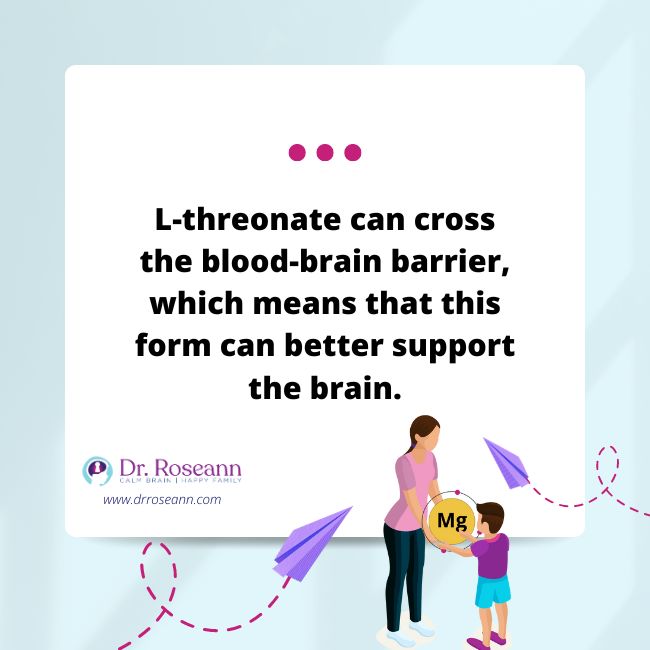
L-threonate can cross the blood-brain barrier, potentially enhancing memory and cognitive performance.
Including magnesium sources like L-threonate in the diet or supplementation regimen may prove advantageous for individuals seeking to sharpen their mental acuity and maintain cognitive vitality.
Remember, magnesium is not a magic bullet. While it holds promise for improving mood and mental health, it's most effective when combined with a comprehensive approach. It's crucial to consult a healthcare professional to determine the appropriate Vitamin D and magnesium for depression dosage for your child’s individual needs and potential interactions with medications. While generally safe, magnesium sensitivity symptoms can cause side effects like diarrhea at high doses.
Can magnesium make depression worse?
No. Magnesium is generally considered beneficial for mental health, especially depression. However, it is crucial to consult with a healthcare professional to determine the appropriate magnesium dosage tailored to individual needs.
Is magnesium good for depression?
Yes, magnesium is believed to have a positive impact on depression. It plays a role in neurotransmitter regulation, hormone balance, and other physiological processes, making it potentially beneficial for alleviating depressive symptoms. One may use magnesium glycinate for depression.
What is the best magnesium for anxiety and depression?
Magnesium glycinate is often recommended as the best form for anxiety and depression due to its high bioavailability and calming effects. Its ability to be well-tolerated and support mental well-being makes it a popular choice, but individual responses may vary, so consulting with a healthcare professional is advisable for personalized recommendations.
Can you take magnesium with antidepressants?
In general, it is usually safe to take antidepressants and magnesium together. However, it's crucial to consult with a healthcare professional to consider natural solutions for mood and depression in children, instead of combining magnesium and antidepressants or magnesium and SSRIs. Homeopathy magnesium is usually better for kids.
Can lack of magnesium cause headaches?
There’s little information about magnesium causing headaches but magnesium deficiency has been linked to headaches and migraines, as magnesium plays a role in regulating neurotransmitters and blood vessel constriction.
Can lack of magnesium cause dizziness?
Yes, magnesium deficiency and dizziness are related. Magnesium plays a crucial role in maintaining proper nerve function and blood flow, and a deficiency may lead to issues such as dizziness or lightheadedness.
How much magnesium daily for anxiety is needed?
When using magnesium to treat anxiety, the recommended daily dosage varies. However, the common range is between 200 to 400 milligrams. Individual responses may differ depending on one’s specific needs and health conditions. Magnesium treats anxiety more effectively when the ideal dosage is used.
Which magnesium is best for vertigo?
If you’re considering magnesium for vertigo, Magnesium citrate is a good choice. It is often considered the best type of magnesium for headaches and vertigo, as it supports overall nerve function and helps regulate blood flow in the inner ear.
What is the best form of magnesium for anxiety?
Magnesium glycinate is often considered the best form for anxiety symptoms. Its high bioavailability and ability to be well-tolerated make it a popular choice, as it provides calming effects and supports mental well-being. Using magnesium oil for anxiety also works.
Does magnesium help with mood?
Yes, magnesium is believed to have a positive impact on mood. It plays a role in various biochemical processes, including neurotransmitter regulation and hormone balance, which can influence mood.
How quickly does magnesium work for anxiety?
The onset of magnesium's anxiety-relieving effects can vary among individuals. Some may experience a noticeable improvement in magnesium deficiency and anxiety symptoms within a few days of consistent supplementation, while others may require several weeks for the full benefits to manifest.
Can low magnesium cause memory problems?
Yes, low magnesium levels have been associated with memory problems. Magnesium plays a role in various neurological processes, and a deficiency may contribute to cognitive issues, including memory impairment.
Can magnesium cause sleeplessness?
While magnesium is often recommended to promote sleep due to its calming effects, in some individuals, particularly if taken in excessive amounts, it may lead to sleeplessness or insomnia. Magnesium glycinate is often tagged as the best magnesium for anxiety and sleep.
How much magnesium should I take to reduce cortisol?
The optimal dosage of magnesium to reduce anxiety symptoms and cortisol levels can vary among individuals, but a common recommendation is around 200-400 milligrams per day. Magnesium glycinate is the best magnesium for cortisol.
Does magnesium increase serotonin?
Magnesium does play a role in serotonin regulation, but it doesn't directly increase serotonin and magnesium levels in the brain. Instead, it influences serotonin production and release, potentially contributing to a more balanced neurotransmitter environment.
What type of magnesium is best for thyroid problems?
As magnesium plays a role in thyroid function, magnesium citrate is often recommended due to its bioavailability.
Does magnesium glycinate increase testosterone?
Magnesium is involved in various physiological processes, including hormone regulation. Magnesium glycinate is also considered the best form of magnesium for testosterone boost.
Does magnesium oxide help with anxiety?
There are many types of magnesium for anxiety disorder. But while anxiety and magnesium deficiency are highly related, magnesium oxide and anxiety don’t work well together as it has lower bioavailability and may have a laxative effect in higher doses. Like magnesium oxide, magnesium carbonate for anxiety is also not as efficient. Magnesium citrate or glycinate for anxiety is better.
Can magnesium cause anxiety?
While magnesium is generally well-tolerated and often used to alleviate anxiety symptoms, in rare cases, excessive supplementation or sensitivity to magnesium may lead to side effects, including increased anxiety. It's essential to follow the right dose of magnesium for anxiety and consult with a healthcare professional if experiencing any adverse reactions.
Citations
Botturi, A., Ciappolino, V., Delvecchio, G., Boscutti, A., Viscardi, B., & Brambilla, P. (2020). The Role and the Effect of Magnesium in Mental Disorders: A Systematic Review. Nutrients, 12(6), 1661. https://doi.org/10.3390/nu12061661
Boyle, N. B., Lawton, C. L., & Dye, L. (2016). The effects of magnesium supplementation on subjective anxiety. Magnesium Research, 29(3), 120–125. https://eprints.whiterose.ac.uk/111407/
Serefko, A., Szopa, A., Wlaź, P., Nowak, G., Radziwoń-Zaleska, M., Skalski, M., & Poleszak, E. (2013). Magnesium in depression. Pharmacological Reports, 65(3), 547–554. https://doi.org/10.1016/s1734-1140(13)71032-6
Dr. Roseann is a mental health expert in Mental Health who frequently is in the media:
- Break the Rules Podcast Overcoming Anxiety & Mental Health Disorders.
- CBS2 New York (Article) Experts Offer Tips On How To Help Children Deal With Anxiety.
- What if it's Not Depression (Video) Anxiety, OCD and Trichotillomania.
Always remember… “Calm Brain, Happy Family™”
Disclaimer: This article is not intended to give health advice and it is recommended to consult with a physician before beginning any new wellness regime. *The effectiveness of diagnosis and treatment vary by patient and condition. Dr. Roseann Capanna-Hodge, LLC does not guarantee certain results.
Are you looking for SOLUTIONS for your struggling child or teen?
Dr. Roseann and her team are all about science-backed solutions, so you are in the right place!
Grab your complimentary copy of
147 Therapist-Endorsed Self-Regulation Strategies for Children: A Practical Guide for Parents
Dr. Roseann is a Children’s Mental Health Expert and Licensed Therapist who has been featured in/on hundreds of media outlets including The Mel Robbins Show, CBS, NBC, PIX11 NYC, Today, FORBES, CNN, The New York Times, The Washington Post, Business Insider, Women’s Day, Healthline, CNET, Parade Magazine and PARENTS. FORBES called her, “A thought leader in children’s mental health.”

She coined the terms, “Re-entry panic syndrome” and “eco-anxiety” and is a frequent contributor to media on mental health.
Dr. Roseann Capanna-Hodge has three decades of experience in working with children, teens and their families with attention-deficit hyperactivity disorder (ADHD), autism, concussion, dyslexia and learning disability, anxiety, Obsessive Compulsive Disorder (OCD), depression and mood disorder, Lyme Disease, and PANS/PANDAS using science-backed natural mental health solutions such as supplements, magnesium, nutrition, QEEG Brain maps, neurofeedback, PEMF, psychotherapy and other non-medication approaches.
She is the author of three bestselling books, It’s Gonna Be OK!: Proven Ways to Improve Your Child's Mental Health, The Teletherapy Toolkit, and Brain Under Attack. Dr. Roseann is known for offering a message of hope through science-endorsed methods that promote a calm brain.
Her trademarked BrainBehaviorResetⓇ Program and It’s Gonna be OK!Ⓡ Podcast has been a cornerstone for thousands of parents facing mental health, behavioral or neurodevelopmental challenges.
She is the founder and director of The Global Institute of Children’s Mental Health, Neurotastic™Brain Formulas and Dr. Roseann Capanna-Hodge, LLC. Dr. Roseann is a Board Certified Neurofeedback (BCN) Practitioner, a Board Member of the Northeast Region Biofeedback Society (NRBS), Certified Integrative Mental Health Professional (CIMHP) and an Amen Clinic Certified Brain Health Coach. She is also a member of The International Lyme Disease and Associated Disease Society (ILADS), The American Psychological Association (APA), Anxiety and Depression Association of America (ADAA) National Association of School Psychologists (NASP), International OCD Foundation (IOCDF).
© Roseann-Capanna-Hodge, LLC 2024





